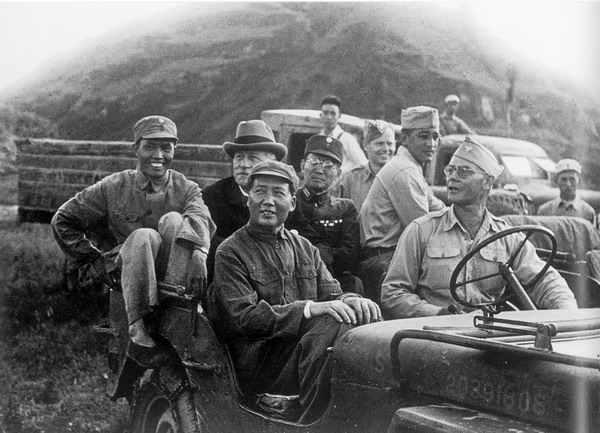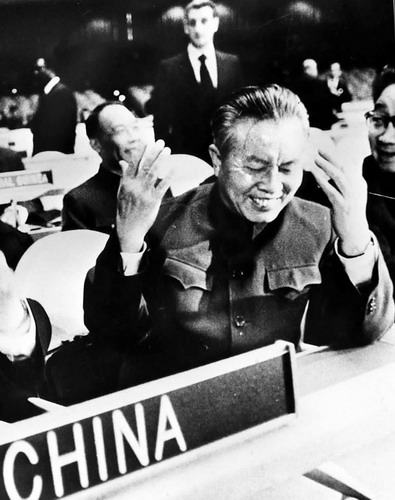Profiles
Former Mao translator, diplomat Huang dies
By Yang Guang (China Daily)
Updated: 2010-11-25 07:51
 |
Large Medium Small |
|
 Huang Hua (left) and Mao Zedong welcome General Zhang Zhizhong (third from left, second row) from Kuomintang and US ambassador to China Patrick Hurley (second from left, second row) on Aug 27, 1945, at Yan'an airport in Shaanxi. Zhang, Chiang Kai-shek's representative, and Hurley flew to Yan'an to accompany Mao to Chongqing for negotiations to avoid a civil war. [Photo/by John Colling]
|
Statesman a witness to China's modern diplomacy
BEIJING - Huang Hua, a veteran statesman, former foreign minister, vice-premier and vice-chairman of the Standing Committee of the National People's Congress, died on Wednesday at the age of 98.
For almost 80 years, Huang, also a former translator for Mao Zedong, was a witness and active participant in the development of the Chinese revolution and diplomacy.
Henry Kissinger, former US secretary of state, said he admired Huang's "diplomatic skills, subtlety and tenacity - all these qualities combined with extraordinary human warmth and reliability".
|
 Huang Hua, as China's representative to the United Nations, applauds during the 26th UN General Assembly on Oct 25, 1971, when it passed Resolution 2758 to restore the lawful rights of the People's Republic of China at the world body. [Photo/Xinhua]
|
Huang's revolutionary and diplomatic career began in 1936, when he was a progressive student at Yenching University in Beijing.
Working as an interpreter, he helped with American journalist Edgar Snow's coverage in northern Shaanxi - then a revolutionary base of the Communist Party of China (CPC). Snow's work later became Red Star over China, the first book by a foreign correspondent about "Red China" and CPC leaders such as Mao Zedong and Zhou Enlai.
From then until the end of the War of Resistance against Japanese Aggression in 1945, Huang mostly stayed in Yan'an, then headquarters of the CPC.
After the founding of New China in 1949, Huang served as the Chinese ambassador to Ghana, Egypt and Canada.
Huang was with the Chinese negotiating team when Kissinger secretly visited China to break the ice between the two countries in 1971. He later worked as the Chinese envoy to the United Nations until October 1976, when he returned to China to be appointed foreign minister.
A chance encounter with American violinist Isaac Stern at a party in the United States in 1976 impressed Huang so much that he sent an invitation to Stern in 1978 for a visit to China.
Stern's three-week stay in China had a deep impact on the development of classical music in China, and during his time here he collaborated with the China National Symphony Orchestra and coached Chinese music students.
As foreign minister, Huang oversaw the negotiations and final signing of the Sino-Japanese Treaty of Peace and Friendship. He also made strenuous efforts to improve relations with India and the former Soviet Union.
After his retirement from official posts, Huang kept up with his wide circle of international friends and took the initiative to establish many worthy causes.
He headed the China Welfare Institute, a child welfare organization founded by Soong Ching Ling, the China Society for People's Friendship Studies, the Great Wall Society and a host of other institutions.
A learner all his life, Huang learned to use computer after his retirement. In his own words, "I still try to stick to my motto: It is never too late to learn."
Huang published his memoirs at age 95, in which he recounted 70 years of modern Chinese diplomacy, based on his own experience and backed by material from official files.
"Through his memoirs, one can see that this senior diplomat paid special attention to making friends and coming to terms with people of different backgrounds and beliefs," said Lin Wusun, former president of China International Publishing Group.
"His straight-forwardness and warmth of character proved to be a great plus in liaising with diplomats and leaders," Lin said.